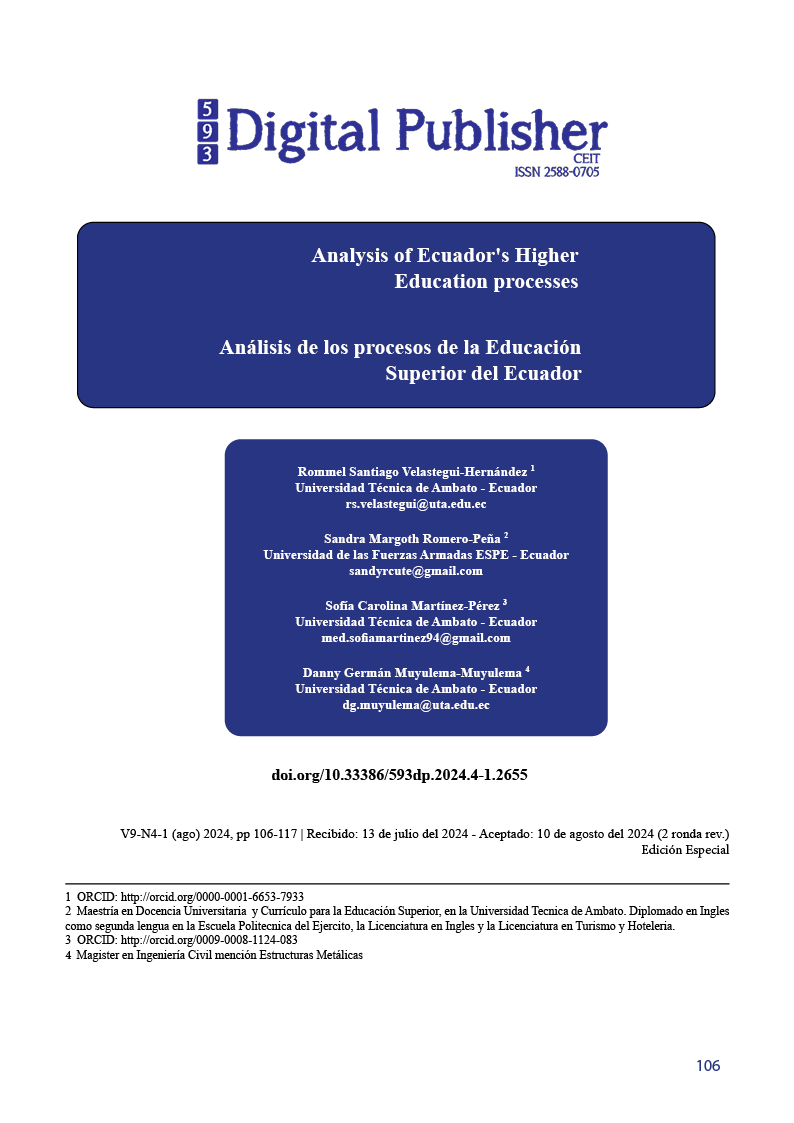Analysis of Ecuador's Higher Education processes
Main Article Content
Abstract
The Higher Education system in Ecuador has undergone significant transformations in recent years, driven by certain political reforms, the factors that have affected it are the use of advanced technologies and a focus on inclusion and diversity. This article analyzes these changes and their impact on the country's educational institutions. It is based on the Organic Law of Higher Education (LOES) of 2010 which has been crucial to improve the quality and accessibility of education, resulting in a 20% increase in university enrollment. In addition, universities are adapting their academic programs and curriculum designs to align with the needs of the labor market, collaborating closely with industry to develop relevant skills. The incorporation of online learning platforms, accelerated by the COVID-19 pandemic, has allowed for greater flexibility and accessibility, adopting hybrid models that combine face-to-face and online learning. Inclusion and diversity policies have been effective in increasing the representation of underrepresented groups, although challenges related to inequality and funding persist. Emphasis on research and collaboration with international institutions is positioning Ecuadorian universities in the global academic arena, fostering scientific and technological development. These efforts, together with the adoption of educational technologies and inclusive policies, indicate that the higher education system in Ecuador is undergoing a significant transformation process, preparing to face future challenges with a solid foundation in reform, inclusion, and technology.
Downloads
Article Details

This work is licensed under a Creative Commons Attribution-NonCommercial-ShareAlike 4.0 International License.
1. Derechos de autor
Las obras que se publican en 593 Digital Publisher CEIT están sujetas a los siguientes términos:
1.1. 593 Digital Publisher CEIT, conserva los derechos patrimoniales (copyright) de las obras publicadas, favorece y permite la reutilización de las mismas bajo la licencia Licencia Creative Commons 4.0 de Reconocimiento-NoComercial-CompartirIgual 4.0, por lo cual se pueden copiar, usar, difundir, transmitir y exponer públicamente, siempre que:
1.1.a. Se cite la autoría y fuente original de su publicación (revista, editorial, URL).
1.1.b. No se usen para fines comerciales u onerosos.
1.1.c. Se mencione la existencia y especificaciones de esta licencia de uso.
References
Aguirre, P., Villota, F. H., & Mera, S. (2023). Sustainability in higher education in Ecuador- Universidad Técnica del Norte case study. International Journal of Sustainability in Higher Education, 24(5), 1136–1160. https://doi.org/10.1108/IJSHE-07-2021-0268/FULL/PDF
Alvarado, P. R., & Malbarez, M. C. R. (2023). Auditoría de género: Un enfoque desde la responsabilidad social universitaria. Revista de Ciencias Sociales, 29(3), 219–235. https://doi.org/10.31876/RCS.V29I3.40713
Arteaga-Briones, L. A., Azúa-Arteaga, A. A., & López-Padrón, A. (2023). Modelo para seguimiento de graduados: Hacia el aseguramiento de la calidad de la Educación Superior ecuatoriana. Revista de Ciencias Sociales, 29(3), 264–279. https://doi.org/10.31876/RCS.V29I3.40711
Clavijo Castillo, R. G., & Bautista-Cerro, M. J. (2020). Inclusive education. Analysis and reflections in Ecuadorian Higher Education. ALTERIDAD.Revista de Educación, 15(1), 113–124. https://doi.org/10.17163/ALT.V15N1.2020.09
Ely, M., Magíster, B. /, & Ferruzola, E. (2015). Los Sistemas de información gerencial: aplicabilidad en procesos empresariales y de educación superior en el Ecuador. SATHIRI, 8, 136–149. https://doi.org/10.32645/13906925.402
Espinosa, B., María Goetschel, A., & Carrasco, F. (2022). Dreams of a Globalized University in Ecuador: The Reforms of the Rafael Correa Government. Https://Doi.Org/10.1177/0094582X221084302, 49(3), 31–48. https://doi.org/10.1177/0094582X221084302
Guacho, G. K. B., Vallejo, P. X. M., & Sanaguano, M. E. V. (2021). Predicción del nivel de riesgo de reprobación estudiantes de educación superior usando un modelo de red neuronal artificial. ConcienciaDigital, 4(3.1), 95–104. https://doi.org/10.33262/concienciadigital.v4i3.1.1816
Guerrero, L. K. S., Sandoval, J. A. D., & Álvarez, J. M. G. (2022). Bases pedagógicas en la formación del docente de Educación Superior Técnico-Tecnológica en el Ecuador. Revista Conecta Libertad ISSN 2661-6904, 6(3), 14–28. https://revistaitsl.itslibertad.edu.ec/index.php/ITSL/article/view/307/485
Hernández, R. S. V., López, G. A. A., Ases, M. J. M., & Dávila, C. A. H. (2023). Gestión educativa de la recreación infantil para escolares. ConcienciaDigital, 6(4), 193–208. https://doi.org/10.33262/concienciadigital.v6i4.2701
Jameson, K. P. (1997). Higher education in a vacuum: Stress and reform in Ecuador. Higher Education, 33(3), 265–281. https://doi.org/10.1023/A:1002992020931/METRICS
Javier, P., Guamán, S., Pastora, M., Sánchez, G., Virginia, ;, Suarez Guamán, J., & Pastora, K. (2017). La educación superior en el Ecuador Vs Las nuevas tecnologías. RECIMUNDO, 1(5), 484–496. https://doi.org/10.26820/RECIMUNDO/1.5.2017.484-496
Johnson, M. A. (2017). Contemporary Higher Education Reform in Ecuador: Implications for Faculty Recruitment, Hiring, and Retention. Education Policy Analysis Archives, 25(68). https://doi.org/10.14507/epaa.25.2794
Mendoza, M. L., Ortega Santos, J. P., & Llerena Gavilánez, C. A. (2014). Strategic alliances in higher education in Ecuador: the challenge of knowledge transfer and its effect on the learning curve. Suma de Negocios, 5(12), 96–104. https://doi.org/10.1016/S2215-910X(14)70031-X
Nevárez, L. E. S., Ramírez, C. M. G., Fuente, E. M. I., & Cerezo, G. A. P. (2022). DESARROLLO SOCIAL Y EDUCACIÓN SUPERIOR EN EL ECUADOR. Journal of Science and Research, 7(CININGEC II), 844–856. https://doi.org/10.5281/zenodo.7778856
Orellana, V., Cevallos, Y., Tello-Oquendo, L., Inca, D., Palacios, C., & Renteria, L. (2019). Quality evaluation processes and its impulse to digital transformation in ecuadorian universities. 2019 6th International Conference on EDemocracy and EGovernment, ICEDEG 2019, 338–343. https://doi.org/10.1109/ICEDEG.2019.8734373
Pacheco, J. A. B., Teijeiro-álvarez, M. M., & García-álvarez, M. T. (2020). Sustainable Development in the Economic, Environmental, and Social Fields of Ecuadorian Universities. Sustainability 2020, Vol. 12, Page 7384, 12(18), 7384. https://doi.org/10.3390/SU12187384
Pedrera, C. J. (2014). La gestión universitaria basada en el clima organizacional utilizando principios del modelo de la endocalidad. Sur Academia: Revista Académica-Investigativa de La Facultad Jurídica, Social y Administrativa, 1(2). https://revistas.unl.edu.ec/index.php/suracademia/article/view/21
Post, D. (2011). Constitutional Reform and the Opportunity for Higher Education Access in Ecuador Since 1950. Education Policy Analysis Archives, 19(0), 20. https://doi.org/10.14507/epaa.v19n20.2011
Saavedra, F. M. (2012). Higher Education Reform in Ecuador and Its Effect on University Governance. International and Development Education, 161–175. https://doi.org/10.1057/9781137040107_11
Sánchez, T., Gilar-Corbi, R., Castejón, J. L., Vidal, J., & León, J. (2020). Students’ Evaluation of Teaching and Their Academic Achievement in a Higher Education Institution of Ecuador. Frontiers in Psychology, 11, 509559. https://doi.org/10.3389/FPSYG.2020.00233/BIBTEX
Serrano de Moreno, M. S., Castellanos Herrera, S. J., & Andrade, D. J. (2024). Competencias en investigación del profesorado universitario: Desafíos en la construcción de la cultura investigativa. Revista de Ciencias Sociales, 30(1), 381–397. https://doi.org/10.31876/RCS.V30I1.41662
Torres-Diaz, J., Torres-Diaz, J., & Duart, J. (2015). Determinants of digital inequality in universities: the case of Ecuador. Journal of E-Learning and Knowledge Society, 11(3).
Trujillo, S. (2023). Educación Superior, pilar fundamental en el desarrollo integral del Ecuador. Educación, Arte, Comunicación: Revista Académica e Investigativa, 2(1). https://revistas.unl.edu.ec/index.php/eac/article/view/1997
Velastegui, R., Poler, R., & Díaz-Madroñero, M. (2023). Aplicación de algoritmos de aprendizaje automático a sistemas robóticos multiagente para la programación y control de operaciones productivas y logísticas: una revisión de la literatura reciente. Dirección y Organización, 0(80), 60–70. https://doi.org/10.37610/DYO.V0I80.643
Velastegui, R., Poler, R., & Diaz-Madroñero, M. (2023). Conceptual model for scheduling and control of production and logistics operations using multi-agent robotic systems and blockchain. DYNA, 98(3), 307–313. https://doi.org/10.6036/10724





